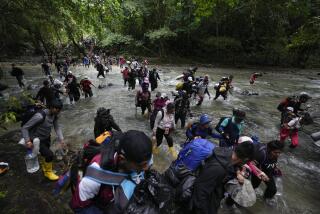U.S. Moves to Curtail Panama Fallout : War on drugs: The White House seeks to reassure Latin leaders that military intervention is not typical of its strategy.
WASHINGTON — In the wake of the Bush Administration’s use of a military invasion to oust a leader accused of drug trafficking in Panama, U.S. officials are striving to prevent adverse Latin American reaction from hampering its drug-interdiction efforts in other countries in the region.
Bush Administration diplomatic officials won agreement this week from the Peruvian government to reverse its declared halt to cooperative drug-fighting operations with U.S. agents in that country.
But as the White House ponders a welter of military-based drug-fighting initiatives it hopes to use around the world, Administration officials said that they have taken Peruvian President Alan Garcia’s original rebuke to heart and are mounting special efforts to assure Latin American governments that the Panama invasion is not a model of its “drug war” strategy.
White House Press Secretary Marlin Fitzwater, speaking with reporters in Corpus Christi, Tex., where President Bush has been vacationing, confirmed this week that the President is mapping plans to use the U.S. military to disrupt Latin drug supply routes.
While defense sources said the plan would involve relatively independent U.S. Navy operations off the Colombian coast, Fitzwater took pains to portray it as a collaborative effort “to help the countries of Latin America interdict those supply routes.”
“We are anxious to work closely with Colombia,” Fitzwater said. “Whatever actions we would undertake in this regard will be done with the closest consultation with them and coordination with them.”
Many Bush Administration officials have dismissed Peru’s early reaction--as well as Bolivia’s and Colombia’s initial condemnations of the Panama operation--as political posturing, adding that the drug-troubled Andean countries were privately relieved by the removal of Panamanian strongman Manuel A. Noriega.
“But the posturing does in fact reflect political realities in their own countries and it has an impact which is hard to measure,” said University of Florida Dean Ambler Moss, who was ambassador to Panama from 1978 to 1982.
“There will be reluctance to do much more on the part of the Latin American leadership to expose themselves to the domestic political pressure,” Moss added. “The feeling is, ‘We don’t need this camel’s nose under our tent.’ ”
“They’ve all got to posture the way they’re posturing right now,” said one knowledgeable Administration official. But he acknowledged that “it can’t be ignored” in light of Latin American sensitivity about violations of sovereignty in the region.
Overcoming the Latin Americans’ heightened uneasiness has become a key task for U.S. diplomats as they prepare for the scheduled February summit between President Bush and the leaders of Colombia, Bolivia and Peru.
Garcia has said that he will not attend the meeting in Cartagena, Colombia but has agreed to send lower-level officials for preparatory meetings.
So far, neither Bolivian President Jaime Paz Zamora nor Colombian President Virgilio Barco Vargas has threatened to withdraw from cooperative efforts with the United States to fight drugs.
But one Colombian expert said that Barco will come under increasing domestic political pressure to distance himself from the United States.
“President Barco will keep on cooperating, but he will have to face some sort of either opposition or bad will from certain quarters in Colombia, who until a few days before would have agreed with him wholeheartedly,” said Patricia Anzola, a Bogota-based communications consultant.
“The fact that President Bush used the issue of drug trafficking as one of the reasons for Panama is making a lot of people nervous around here,” Anzola added. “At any time, the United States might believe that Colombia isn’t doing enough in the drug war and decide to take similar action here.”
Times staff writer James Gerstenzang, in Corpus Christi, contributed to this story.
More to Read
Sign up for Essential California
The most important California stories and recommendations in your inbox every morning.
You may occasionally receive promotional content from the Los Angeles Times.











